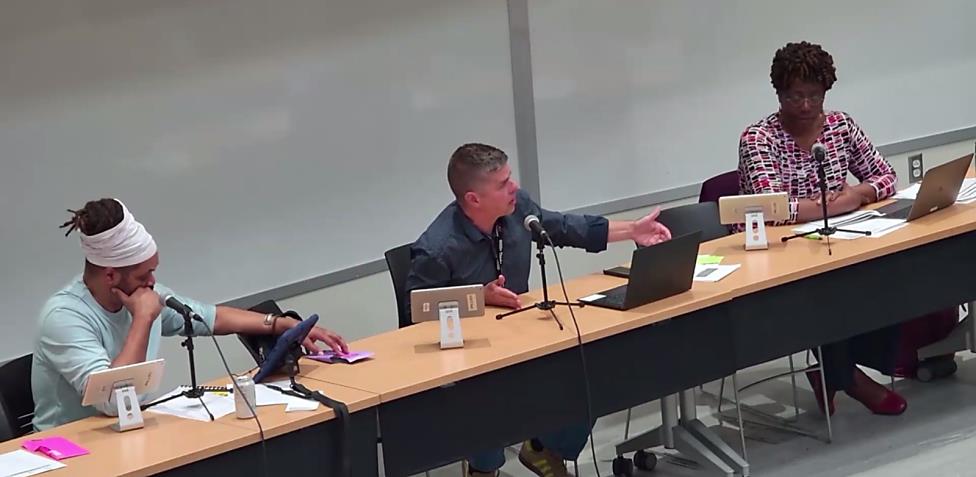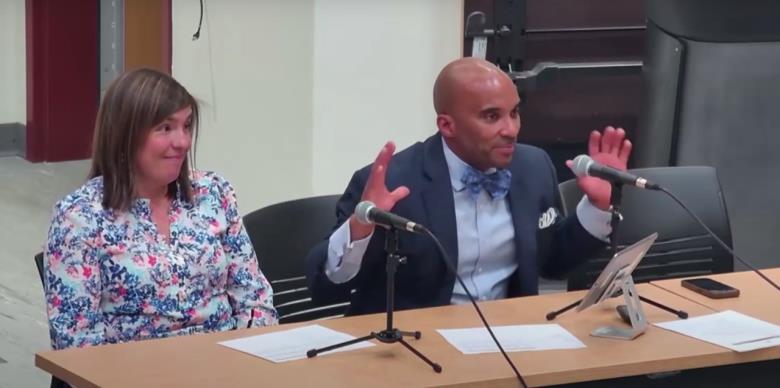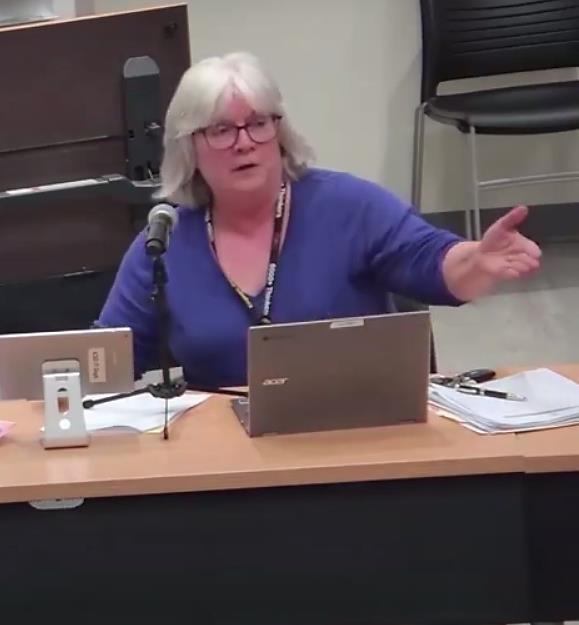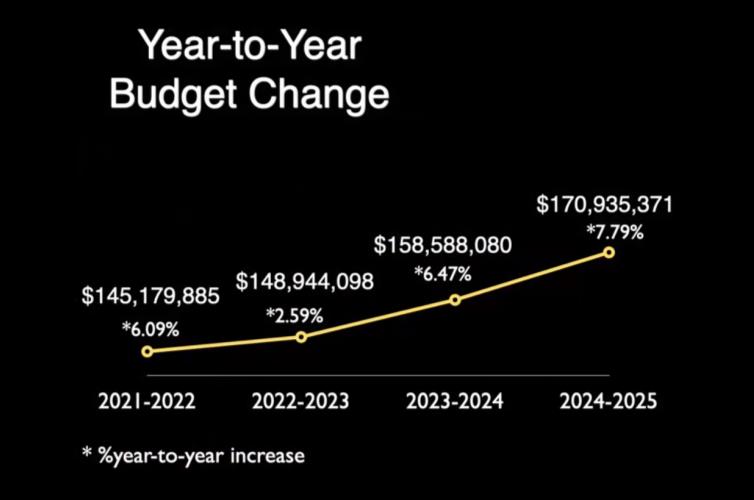by Robert Lynch; April 11, 2024
“We want to be the best school district in America.”
Superintendent Dr. Luvelle Brown, to the Ithaca School Board’s Finance Ctte. April 9.

Maybe the big story emerging from this week’s meeting of the Ithaca Board of Education’s Finance Committee wasn’t what happened, but rather what never did. Six of the School Board’s nine members, conferring together, couldn’t come to terms on how to cut a 12.1 per cent increase in the projected tax levy a proposed 2024-25 school district budget would impose on residents.
No resolutions were offered or voted on by the committee at its April 9th meeting. And one must wonder whether the entire Board will come up with a compromise in time to meet a self-set goal of finalizing the budget just seven days later, on Tuesday, April 16th.
“The good news is we’re not voting tonight,” Finance Committee Chair Eldred Harris told Board members. Yet Harris also interjected, “Where are our math teachers? Do we have any math teachers here?”
Given how indecisive the six who must later vote on that budget were despite an hour and 20 minutes of discussion, it’s quite likely the Board will hold off a final budget decision until a potential special meeting later in the month. An administrator stated that New York State demands a Board decision by April 25th.
Ithaca district residents will themselves get to vote on the budget May 21.
On March 26th, Ithaca City School District (ICSD) Superintendent Dr. Luvelle Brown presented the Board his proposed nearly $171 Million next year’s spending plan. It would hike spending by 7.79 per cent from the current year’s budget, but elevate the tax levy on property owners by a much-larger 12.14 per cent figure.
Board members and district officials made it clear this past Tuesday they’d heard from nervous, even angry, taxpayers. But they also agonized between conflicting objectives: keeping tax bills from spiraling out of control, but also meeting their goal of providing Ithaca’s students a world-class education.
“We are living in a high-tax area and our assessment values are skyrocketing, and its falling on the backs of homeowners,” Superintendent Brown acknowledged. “Trust me, I go to Wegmans often and I hear it, and I feel it as a community member.”
“We know that,” Brown said. And then he pivoted. “And I also know that the kind of shift that we would have to make of not having our $170 Million fund request would be uncomfortable for this community as well.”
“We want to be inclusive. It costs. We want to be equitable. It costs. We want to be the best school district in America. It is expensive,” Brown said.

And to some disgruntled Ithaca taxpayers, Dr. Brown’s words only confirm and validate what they’ve suspected all along: namely that the Ithaca City School District spends beyond its community’s means, seeking instructional excellence at an unaffordable price. Whether true or not, the notion has a way of resonating when local property assessments are rising annually by an average 20 per cent.
“I think what many people are asking for is that we want to trust you,” Board member Jill Tripp said she senses constituents telling the Board and administration. “We’ve trusted you for years. But we feel like there’s some things in the district that could be looked at more carefully. There’s probably some positions that could be cut. There may even be some programs that could be cut back,” Tripp inferred taxpayers are thinking.
Tripp continued, “We’re abdicating our responsibility as a Board for us to just say, ‘take it or leave it,’ when many, many well-meaning people are saying we can’t just take that; we have to know that you’re doing your best.”
Committee Chair Harris acknowledged Tripp’s concerns. And colleague Garrick Blalock agreed that “there’s a pain there that people are legitimately feeling.” Yet Tripp was the only Board member that day to get specific with her suggestions. She urged administrators identify ways to cut $2 Million from the budget Superintendent Brown had proposed.
Blalock, meanwhile, urged reconsideration of a revenue-raiser briefly floated, then quickly dropped amid public outcry a few years ago, namely the ICSD imposing a tax on utilities, such as on cell phones, electric bills, and the like.
“Utilities tend to be a fairly stable thing to tax,” Blalock reasoned, though perhaps conveniently forgetting how rapidly NYSEG bills escalate. There’s a second benefit, he said. “It also has the feature of asking residents who aren’t single-family homeowners to chip in a little bit.”
Blalock conceded that a utility tax “was not a winner the last time it was discussed.” Administrators cautioned that imposing such a tax takes time and would not be available in this current budget cycle.
Amanda Verba, ICSD’s Chief Operating Officer, had laid out for Board members that night several budget-cutting options, choices not yet posted on the School District’s website. One option would slash-and-burn with a 20 per cent spending reduction. Tripp called that choice “a straw man.” Said Tripp, “Nobody’s looking at that.” On her calculator, Verba projected were 20 per cent cuts to come solely from instructional staff, 618 Ithaca teachers would lose their jobs.

A mid-range option, one holding greater promise, though never fleshed-out with specifics, would strike some middle ground between the current year’s $158.9 Million ICSD budget and the $170.9 Million in next year’s spending Dr. Brown has proposed. It would reduce the levy increase down to 7.1 per cent. And it would cut proposed spending by $3.4 Million.
“Three-point-four Million is not insignificant,” Brown said. He estimated it could idle 60 or more employees. “We will start with administration,” he promised. “We would do that first.” But then, Brown said, close to $3 Million more in added savings would need to be found. “And that’s real programs,” he warned.
Verba cautioned that budgeting to a number, rather than to a need is something foreign to where she works. “That is not the way that we do the budget in the Ithaca City School District,” Verba told the Board. “However, if that is something that we want to begin in fiscal year ’25 and pick a number and then drive to our values and our principles and our vision and our mission and our goals and our priorities, that will be something that we will retrain our brains to do.”
But training kids rather than retraining themselves to budget backwards is what most on the Ithaca Board of Education find the higher priority. And teaching to the taxpayers’ test for them won’t come easy.

“If we’re looking for any deep dive, it’s personnel that usually goes first, and are we willing to do that?” Board member Karen Yearwood asked. She then promptly answered her own question. “And I know we’re not,” she said, “so we have to be honest about it.”
Someone—committee chair Harris didn’t say whom—had proffered that the ICSD set a tax levy increase equivalent to the Consumer Price Index, or about four per cent. That’s “very astute, but not exactly correct,” Harris cautioned. He employed a household analogy.
“If milk and sugar and bread and the cost of furniture has risen by four per cent because of inflation, we’re carrying those costs,” Harris explained. “If the cost of mowing the lawn and cleaning the windows and cleaning the pool and all the other staff considerations that we have to commit to outside of that inflationary increase rise also, you can see that an additional amount would be necessary on top of the inflationary amount that is baked into everybody’s budget.”
Eldred Harris is a lawyer, not an economist, so forgive him. An Ithaca School budget—past, present, and also future—covers labor cost as well as that of things a school district buys. Unless one embraces Dr. Brown’s stated, lofty goal of raising staff salaries a full 20 per cent over the next three years, a percentage increase of four per cent would cover everything, people as well as stuff.
Again, Ithaca School Board members are far away from nailing down a budget. They’ve got the month of April to do it. Their next bite of the budget apple happens on the 16th.
###

